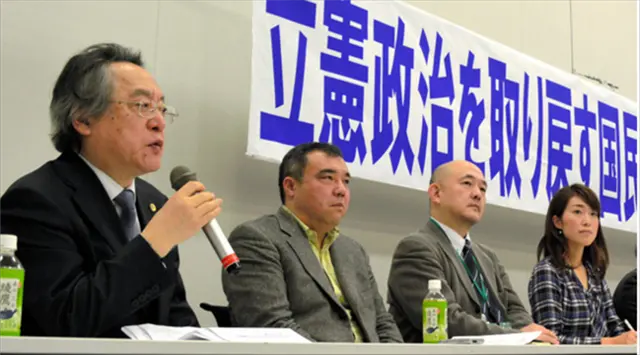A prominent scholar who blasted a package of security bills as unconstitutional in a high-profile Diet session will run in the Upper House election, targeting swing voters disillusioned with the status quo.
Setsu Kobayashi, professor emeritus of constitutional law at Keio University, is also expected to form a political organization under the “anti-Abe” banner and field at least nine other candidates in the poll, likely to be held in July.
“The Democratic Party, which we pinned our hopes on as the party to lead efforts to unite opposition forces, is dragging its feet so we are afraid that we will run out of time,” he said of the initiative in an interview with The Asahi Shimbun. “I will become a standard-bearer so as to generate interest among independent voters who remain distrustful of the existing political parties.”
Kobayashi, 67, is eyeing a candidacy in the proportional representation segment of the Upper House poll, and is soliciting candidates online and other means to oppose the administration of Prime Minister Shinzo Abe.
He expects the new organization to be led by individuals from the private sector including academics, business leaders and cultural figures.
The new political organization will be built on a policy platform of five key issues: abolition of the national security legislation, which was railroaded last year despite public outcry; restoration of freedom of speech, which critics believe has been undermined under the current administration; postponing a rise in the consumption tax from 8 percent to 10 percent, which is scheduled for April 2017; ending reliance on nuclear power plants; and blocking attempts by some conservative forces to revise the Constitution.
Kobayashi is one of the three scholars who all declared a package of security bills, which Abe pushed, as unconstitutional when they testified before a Lower House commission meeting on constitutional affairs last June.
Kobayashi criticized the legislation, which authorizes Japan’s use of force overseas under collective self-defense for the first time in postwar years, on the grounds that it was drafted on the basis of reinterpreting the war-renouncing Constitution, and not through due process.
Kobayashi spearheaded efforts to unify opposition parties to help scrap the legislation by forming a group of legal experts, academics and journalists in January. The law took effect in late March.
Under the Public Offices Election Law, a political organization is required to enter 10 or more candidates for it to be accredited and wage an election campaign similar to one by a political party.
Kobayashi plans to raise funds to cover the deposits for the candidacies--6 million yen ($55,555) per candidate in the proportional representation section--on the Internet.
His move came after a series of meetings with some members of the Democratic Party and other opposition parties did not gain their support for compiling a unified list of candidates for the opposition bloc, excluding the Japanese Communist Party.
The list, he suggested, should be made for candidates under the proportional representation segment of the Upper House election. But Kobayashi could not secure the Democratic Party leadership’s buy in for the proposal.
As a result, he shelved collaboration with opposition parties and independent Upper House members and instead decided to seek a new path.
(ASAHI SINBUM)
 简体中文
简体中文





